- Home
- P. L. Gaus
Separate from the World Page 6
Separate from the World Read online
Page 6
“Is this split the reason Enos Erb thinks his brother was murdered?”
“I don’t know. Amish aren’t murderers. But Enos has a real problem—something like what Martin Luther faced when he nailed his Ninety-five Theses to the doors of the Wittenberg church.”
“I think we should go out there, Cal—go see what this is all about.”
“To Calmoutier?”
“Right. Now, if you’ve got time. But what about your letter, Cal? This Rachel Ramsayer?”
“That’s gonna have to wait.”
“What if she’s really your daughter?”
“I need time, Mike,” Cal said, shaking his head. “I’m not ready. Not after all these years.”
9
Friday, May 11 4:30 P.M.
MIKE BRANDEN and Cal Troyer drove northeast on State Route 241 to Mt. Hope and then took Mt. Hope Road north to Holmes County 229. At the intersection, there was a single Amish house and the large, open fields of adjoining Amish farms. To the north, the skies were clear, blue, untroubled. To the south there were thunderheads black with turmoil, and lightning flashed along the leading edge, as the storm lumbered toward the east.
Branden turned right onto 229 and followed Troyer’s directions east for several miles, past the old St. Genevieve Church, to a flat and straight stretch where two gravel driveways opposed one another on the two sides of the road. A right turn took them to the Enos Erb farm; a left would have taken them to the Israel Erb farm. At the entrance to the right driveway, Enos had posted a hand-lettered sign on a plywood board:
Beagle Pups—$8
Trained Rabbit Dogs—$17
Edging 229 and set close to the drive, there was a small red barn with a rusty sheet-metal roof. A slat fence surrounding it enclosed a herd of goats. Two billy goats were tethered outside the fence. Forty yards farther down the gravel lane stood the main house—two stories of white wood frame set on pale yellow foundation blocks, with a wide front porch and a green shingle roof. On the lawn between the big house and the driveway, a young boy and girl, dressed in denim blue and flat black, he in a little straw hat and she in a black bonnet, were playing on a sturdy wooden swing set with a green plastic slide. As the professor’s truck approached, the children stopped pumping their little legs and let the swings come to rest. They sat on the swing seats, watching the two English men carefully as Branden and Troyer climbed out of the truck.
Cal called out, “Hi, kids,” but they had no words for him. With blank faces, they watched him approach, apparently unwilling to speak either to him or to each other. Cal thought nothing of it, and Branden knew it was typical behavior. Amish children fall silent in the presence of adults, especially English ones.
There was a side door to the house, covered by a slanting roof of green corrugated plastic. Troyer knocked on the screened door there and stepped back a pace. A woman of average height came to the door, recognized Cal, and greeted him through the screen, “Pastor Troyer.”
The ties of her white prayer cap fell loosely over her bodice. Her dark green dress brushed her ankles, and her black shoes were laced over black hose.
“Hi, Vera,” Cal said. “Is Enos available?”
Vera Erb remained silent while studying the professor, and Cal added, “This is my friend, Vera. Professor Michael Branden.”
Vera nodded a modest greeting to Branden and brought her eyes back to Troyer.
“Enos was in town today,” Cal said. “He came in to see the professor.”
Vera cocked an eyebrow and considered that statement, and Cal realized that she hadn’t known about her husband’s visit to the professor.
“He’s mending tack,” Vera said, and tipped her head toward the stables behind the house.
Branden took a step back, turning toward the stables, but Cal held his place in front of the door. Vera stayed put, watching Cal while nervously drying her hands on a towel.
“Are the troubles getting worse, Vera?” Cal asked.
Vera nodded, ill at ease.
Cal said, “Is Enos going to follow the preacher or the bishop?”
Vera said guardedly, “You’d have to ask him, I reckon.”
“Is this split a done deal?”
“Folks aren’t talking to each other, Cal.”
“Israel’s still with the Antis?”
“I reckon you’d have to ask him.”
“OK, Vera, thanks,” Cal said and turned from the door. Branden fell in beside him, and the two walked down the gravel drive, toward the back.
Branden thought it strange to be watched by so many pairs of eyes. Besides the two children on the swings and Vera, who lingered behind the screen, a lad of about fifteen watched through a kitchen window, and two boys who could have been twins stood at the corner of the house, each with a beagle puppy in his arms. Branden nodded a greeting to the two boys as he passed, but got only blank stares. He knew this was their way with strangers, but he figured they must surely know Cal Troyer and ought to give him at least a nod in return. He felt suspect for being English and knew it was more than typical Amish reticence on display here. These boys might very well have good reasons to be suspicious of him. Still, Branden found it unsettling, and it played on his weary emotions. He dropped his eyes from their view.
Behind the big house, the drive angled ninety degrees to the right, skirted the back of the house, and turned south again after thirty yards. Outside this second curve, a Daadihaus sat at the back edge of the main house, on the west side. It was connected to the main house by a trellis-covered walkway.
Across the drive from the Daadihaus stood an open-fronted stable, divided by weathered boards into seven stalls. Enos Erb was in the second stall, where a dozen odd milk crates had been wired together to make a set of steps. Standing on the top level of this makeshift platform, Enos was fitting one of his Belgian draft horses with a new bit and bridle. The horse was bobbing its head, resisting the bit.
The head of the tan and cream Belgian was nearly as big as Enos himself, but he managed to wrestle the bit into place, and the horse settled down. Enos fastened the straps of new leather around the horse’s head and saw Troyer and Branden only when he turned to descend his milk crates.
“Stubborn horse,” Enos said in his reedy voice. He climbed awkwardly down to ground level and chuckled, “My legs aren’t gonna handle these steps much longer. Getting too old.”
Cal said, “Hi, Enos,” and nodded toward the horse. “You still using Shetler tack?”
“I like ’em good enough,” Enos said.
Cal explained for Branden. “The Shetler brothers over south of Fredericksburg make the best leather tack out here.”
Enos came forward to offer his hand to Cal and then to the professor. Shyly, he said to Branden, “I wasn’t supposed to be on your campus today.”
“Do you still want to talk about your brother?” Branden asked.
Enos shrugged in doubt. “I don’t really know for sure anymore. I’m not sure what I want. Wouldn’t be the first time.”
On stiff legs, Enos moved across the drive to a redwood picnic table behind the Daadihaus. He pulled himself up onto the bench on one side and waved Branden and Troyer over to join him. His chin was little more than six inches above the tabletop, and his feet swung free off the ground. Branden and Troyer took seats on the bench opposite him.
Overhead, against moiling clouds and a darkening sky, a dozen purple martins maneuvered like stunt planes, chasing down mosquitoes. In the grass beside the Daadihaus, a young girl played with beagle puppies in a cardboard box. Three older boys and a girl hoed quietly in a large vegetable garden behind the stables. From a larger barn behind the garden came the ping of a hammer striking metal. There were children’s shouts and the banging of screened doors, as several kids ran into and out of the house in a game of tag. Vera Erb came out after the youngsters and scolded them mildly in German dialect, and the children filed back into the house, teasing and pinching one another once their mother’s back was turned. Ligh
tning flashed to the south, and several seconds later, there was a thunderous rumbling on the horizon.
Enos watched the children and remarked with obvious satisfaction, “Only one of my children is going to be short—a dwarf like me. We’ve got nine. Professor Lobrelli says that’s not too bad with the odds—one dwarf in nine.”
Cal asked, “How well do you know Lobrelli?”
“Good enough, I suppose,” said Erb. “She works on blood—the blood science.”
Branden asked, “Do you go in to see her? Go in to the college, I mean?”
“No. She came out to ask us questions a couple of times. Plus she came out when her scholars helped her take our blood. Mostly we talk to the scholars, now.”
“You mean her students?” Branden asked.
“Students—scholars, yes. The college students. They’re the ones who took our blood. And they come out to talk.”
“Did they do that a lot around here?” Cal asked. “Take blood samples?”
“From those who’d allow it,” Enos said.
“Your whole family?” Cal asked.
“Yep. But not Israel’s. He’s against science.”
“How about Benny?” Branden asked.
“You mean give his blood?”
“Right.”
“Well, he did, yes, but he never told anyone.”
“Benny was modern?” Cal asked. “He went against Israel?”
“Not so’s Israel would know,” Erb said.
Branden asked, “Does anyone in Israel’s family think science is good?”
“Nope. He doesn’t—they don’t. They’re all staying with the bishop.”
Branden asked, “It’s your bishop who’s an Anti?”
“He’s the leader,” Erb said with a distasteful expression.
“Andy Miller?” Cal asked.
“Yes. Andy Miller. He’s asked John Hershberger to take all the modern people and go.”
“So that’s the split, then,” Branden said. “Over Lobrelli’s research. Over genetic research.”
“Blood research,” Enos explained. “She thinks the dwarfism is in our blood. She thinks we give it to our children through our blood.”
“Makes sense,” Cal said. “The genes are in the blood. The DNA tests can trace a genetic defect, if they know the markers to look for.”
Enos nodded with the assurance of someone familiar with science. “She has her scholars ask us a lot of questions about genealogy—those of us who’ll talk about it, anyway. She has the whole clan mapped out on a chart in her office. And the blood is what she works on in her laboratory.”
“That’s pretty modern, Enos,” Cal said. “I’m surprised any Amish are cooperating at all.”
“Preacher Hershberger says it doesn’t make any sense that we’d use Saint-John’s-wort to pick up a mood and not be willing to take modern drugs for depression. He says it’s the same thing, only better, and we’ve been using herbs for centuries.”
Cal nodded agreement.
Branden asked, “Was Benny depressed?”
“Not Benny!” Erb said. “He was the happiest man I know. A real chatterbox.”
“So he would have talked to Lobrelli?” Branden asked.
“Benny talked to everyone,” Enos said. “He went to town any chance he got. Down to Mt. Hope, and Millersburg too. He’d sit down at the courthouse and talk to people. That’s how Lobrelli got to know us all out here—through Benny the chatterbox.”
“Did Andy Miller go against Benny, too?” Cal asked.
“He’s the bishop,” Enos said simply, as if the answer would be obvious. “He’s against just about anything that’s modern—science most of all.”
The wind took a chill, and pulled at Erb’s beard. The storm seemed to be easing northward to find them. Erb ignored a flash of lightning. He let his thoughts wander over a memory, and the distraction showed in his eyes.
Cal noticed and asked, “Have you thought of something, Enos?”
“I was thinking Andy Miller should understand better,” Enos said. “He should understand about medicine better, because his own daughter died of the shakies two years ago.”
“Parkinson’s Disease?” Branden asked.
“Don’t know,” Erb said. “Her hands shook so bad she couldn’t feed herself. Professor Lobrelli says that’s in the blood, too.”
“It’s genetic,” Cal said.
“Yes. Genetics in the blood. That’s what Benny and I have. Lobrelli said we got it from our ancestors.”
“You said Benny was happy and talkative,” Branden said.
Enos nodded, “Benny liked everyone. He was a favorite with the children out here. He’d play with them.”
“Was he backward?” Cal asked. “Childlike?”
“You mean dumb?”
Cal flushed a little red in the cheeks and nodded.
“No,” Erb said, unconcerned. “Benny was smart, normal. And happy. Just is, see, he didn’t have average height.”
Cal sat drumming his thumbs on the picnic table. “You’re talking about a big difference, Enos, between the Moderns and the Antis. Benny would have had to move off Israel’s farm if it came to a head. He’d have had to move.”
“Israel wouldn’t have asked him to move,” Enos said confidently. “He needed Benny to run the store.”
“Benny died in the store,” Troyer explained for Branden.
“Right,” Enos said. “A couple of weeks ago. They say he fell off a ladder, but I don’t believe it.”
Branden and Troyer waited for an explanation.
“Calcification.”
“What?” Branden asked.
“Benny’s legs were stiff like mine, only worse. Calcification. His knees and hips were going bad. He waddled like a duck because he couldn’t bend anymore.”
“He was having trouble walking?” Cal asked.
“Right, worse than me. That’s why Israel and Bishop Miller ought to know not to be so Anti. They ought to let people try the new medicines.”
The dark clouds behind them seemed to edge a boundary between danger and safe haven, blue skies to the north, angry skies to the south. The wind shifted and brought occasional drops of rain, large and powerful when they struck, as if they had fallen from an improbable height.
Branden asked, “Would you have taken Benny in over here?” and turned on his seat to eye the clouds coming in low.
“We talked about that.”
“And?”
“Benny didn’t want to disappoint Israel. So he kept his ideas to himself over there.”
This time Branden held the pause. The wind slapped cold against his back, and he felt exposed. He pushed the storm out of his mind and thought of Benny with his stiff legs. “Benny couldn’t climb ladders anymore,” he mused.
“Right!” Enos said. “So how’d he break his neck by falling off of one?”
10
Friday, May 11 5:35 P.M.
THE PROFESSOR and the pastor were just approaching the college when they heard coming from the campus the deep thumping of a bass and the riffs of a Jimi Hendrix guitar solo in “Hey Joe.” The classic rock and roll song about murder, it was immediately followed by Jefferson Airplane’s “Somebody to Love.”
When Branden turned onto his street, the storm had passed, and the pavement was littered with branches and leaves blown from the trees. The evening air was cold, and the tree limbs hung low, heavy with strain. Branden’s tires hissed through a puddle at the corner, and when he made the turn, he saw Caroline standing out on the pavement of the cul-de-sac in front of their house, listening to the music two blocks away. They came up to her with the windows down, and she said, “It’s starting all over again, Michael. It’s that same music again. It’s Vietnam all over again.”
The professor said, “Hang on,” and parked his truck at the curb.
Caroline and the two men walked toward campus. When they got to the oak grove, they found twenty or thirty students and a few older professors marching in a loos
e circle in front of the stone chapel, around a mound of flowers, balloons, stuffed animals, and cards heaped on the spot where Cathy Billett had died. A scrawny student with a scruffy black beard was loading another CD into a changer. Two large theater speakers stood next to the CD player in the grass. A yellow electric cable with a long extension cord snaked up to a socket set into the foundation stones of the chapel. The mourners had trampled the cable where it crossed the stone walkway, so another student in tattered jeans and a tiedyed T-shirt was trying to fasten the cable to the wet stone with a roll of duct tape marked “Sociology Department.”
Troyer and the Brandens stood back thirty yards from the procession and watched. The next song to play was Peter, Paul, and Mary’s recording of “Blowin’ in the Wind,” and Cal asked Branden, “Where’d these kids learn about all the old songs?”
Branden gave a short laugh, and said, “Newhouse teaches a seminar on the sixties. It’s the most popular class on campus.”
“How many take it?”
“About half.”
“So Newhouse has a ready-made protest march, any time he wants one.”
“Pretty much,” Branden said. “He’s had groups down at the courthouse several times this semester. Says it’s part of his class.”
Aidan Newhouse marched proudly, carrying a tall candle. From his right wrist dangled the silver handcuffs that Ricky Niell had tried to remove. At intervals, Newhouse urged his marchers on. When he saw Mike Branden he waved and stuck his manacled wrist into the air like a badge of honor.
Branden smiled at Newhouse and shook his head. Newhouse was simply obeying his essential nature. He could not have resisted this theater’s stage any more than he could have voted for Reagan.
Newhouse pointed off to the right, and when Branden looked in that direction, he saw Chief of Security Ben Capper standing alone at the far edge of the grove, in the shadow of the history building. He pointed him out to Cal and Caroline, remarking, “Ben Capper fought in Vietnam.”
Cal nodded, eyes fixed on the chief of security.

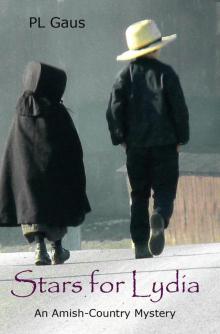 Stars for Lydia
Stars for Lydia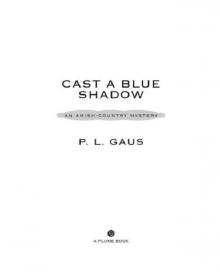 Cast a Blue Shadow
Cast a Blue Shadow Separate from the World
Separate from the World Clouds without Rain
Clouds without Rain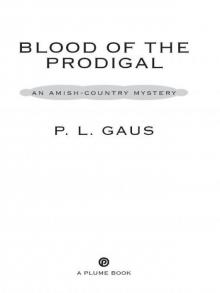 Blood of the Prodigal
Blood of the Prodigal Whiskers of the Lion
Whiskers of the Lion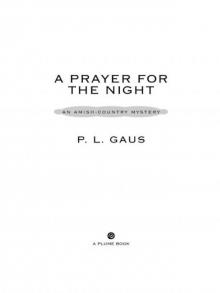 A Prayer for the Night
A Prayer for the Night Broken English
Broken English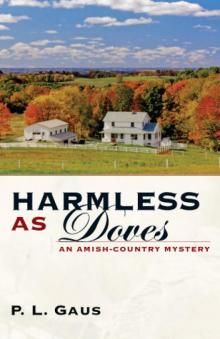 Harmless as Doves: An Amish-Country Mystery
Harmless as Doves: An Amish-Country Mystery